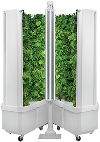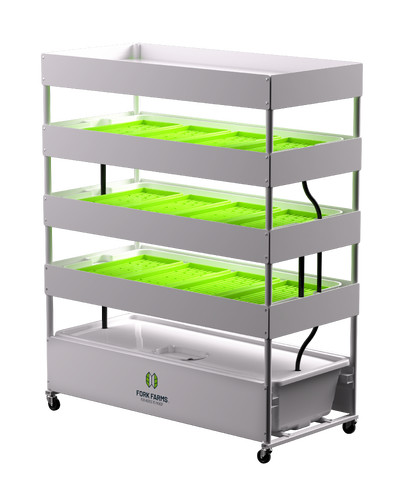Hydroponics in Schools: Cultivating Young Minds
As the educational landscape evolves, schools are increasingly looking for innovative ways to engage students in STEM (Science, Technology, Engineering, and Mathematics) subjects and foster a deeper understanding of sustainability. One of the most promising avenues for achieving these goals is the integration of hydroponic farming systems into school curriculums. This approach not only provides hands-on learning experiences but also instills a sense of environmental stewardship in young minds. Let's explore how hydroponics is making a difference in education and paving the way for a sustainable future.
The Rise of Hydroponic Farming in Educational Settings
The concept of hydroponic farming, a method of growing plants without soil, has been around for centuries, but its adoption within educational settings has seen a significant uptick in recent years. This surge in popularity can be attributed to the growing recognition of the method's sustainability and its alignment with STEM education goals. Hydroponics offers a dynamic platform for students to observe and engage with the plant growth cycle, from germination to harvest, in a controlled environment. This immediate interaction with the growing process not only demystifies scientific concepts but also makes learning more tangible and impactful.
Hands-On Learning: The Hydroponic Methodology
Hydroponic systems, like the Fork Farms Flex Farm, provide an unparalleled hands-on learning experience. Students are able to directly observe the effects of nutrients, light, and water on plant growth, without the unpredictability of soil-based gardening. This allows for more precise scientific experiments, such as manipulating nutrient levels to observe their impact on plant health. The hands-on nature of hydroponics not only enhances students' understanding of plant biology but also nurtures their curiosity and willingness to engage in scientific inquiry.
Fueling STEM Education Through Hydroponic Gardening
Integrating hydroponic gardening into school curriculums seamlessly bridges the gap between theoretical knowledge and practical application in STEM fields. It enables students to apply concepts learned in the classroom—such as the chemistry of nutrients, the physics of light, and the biology of plant growth—in real-world scenarios. Furthermore, managing a hydroponic farm requires students to utilize technology for monitoring plant health, thus incorporating the 'T' in STEM. This practical application of STEM concepts fosters a deeper understanding and retention of knowledge, preparing students for future challenges in these fields.
The Environmental and Nutritional Impact of Hydroponics
Beyond the educational benefits, hydroponic systems in schools serve as a model for sustainable farming practices and nutritional awareness. By producing food locally, hydroponics reduces the carbon footprint associated with transporting produce over long distances. Additionally, hydroponically grown vegetables and fruits often require less water than traditional farming methods, highlighting the importance of resource conservation. Students learn firsthand the environmental impact of their food choices and the benefits of consuming fresh, locally grown produce. This awareness promotes a holistic understanding of sustainability that students are likely to carry into adulthood.
Real-World Problem Solving with Hydroponic Systems
Hydroponic gardens create a unique environment for problem-solving. Students are often faced with challenges such as nutrient imbalances or pH level adjustments that require critical thinking and experimentation to resolve. This process not only enhances their understanding of scientific principles but also develops soft skills such as teamwork, communication, and perseverance. By taking ownership of the garden, students learn responsibility and gain confidence in their ability to tackle complex problems, skills that are invaluable in any career path they choose to pursue.
Hydroponics: A Pathway to Sustainable Future Generations
The integration of hydroponic systems into educational curriculums does more than just enhance STEM education and promote sustainability; it plants the seeds for a greener future. As students become more aware of the environmental impact of their food choices and the potential of innovative farming techniques, they are more likely to advocate for and implement sustainable practices in their personal lives and communities. This ripple effect can lead to the widespread adoption of hydroponics and other sustainable technologies, driving positive change in our global food system.
The incorporation of hydroponic farming systems into school curriculums offers a multitude of benefits. From enriching STEM education with hands-on learning experiences to fostering environmental stewardship and nutritional awareness, hydroponics is an effective tool for preparing students to face the challenges of the future. As schools continue to explore and expand their hydroponic programs, we can look forward to a generation of informed, engaged, and environmentally conscious individuals ready to make a difference in the world.
To check out a sample of Fork Farms STEM Curriculum and learn more about how to get your students involved, click here!
Important Links:
























